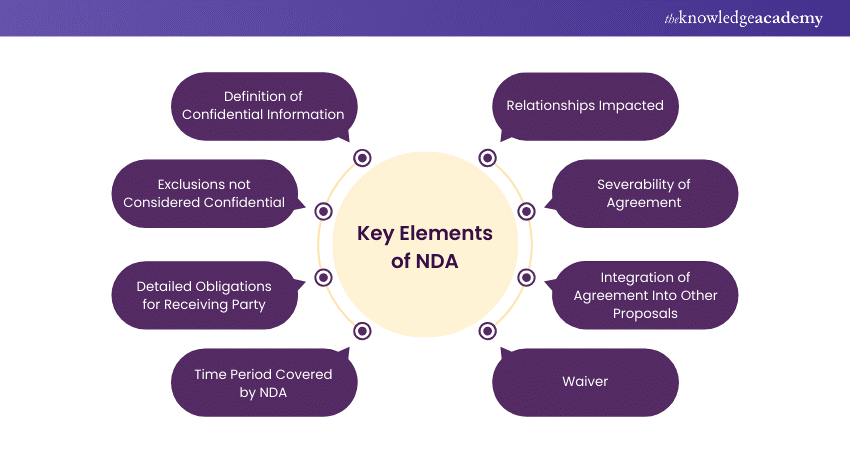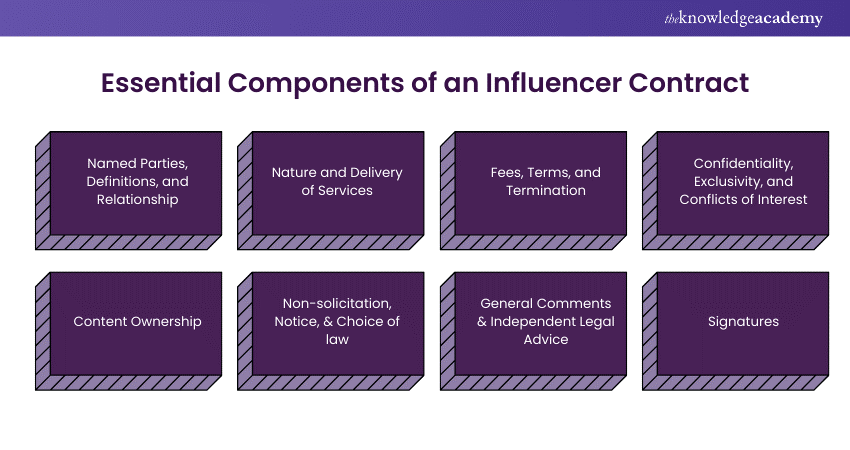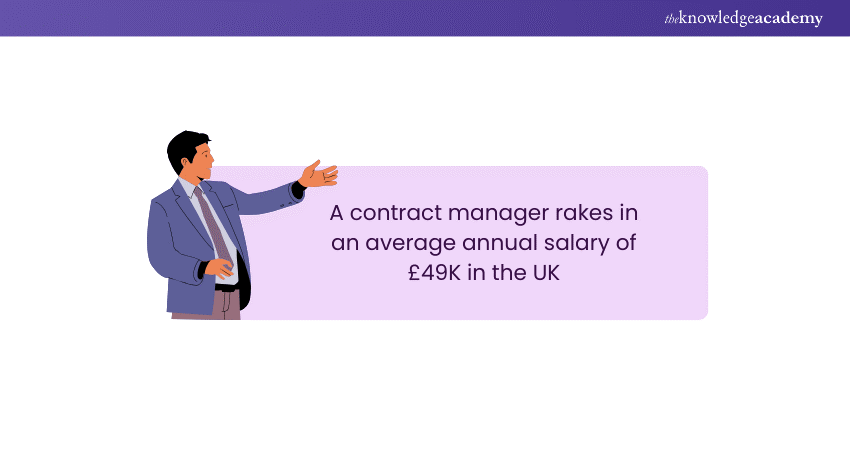We may not have the course you’re looking for. If you enquire or give us a call on +44 1344 203999 and speak to our training experts, we may still be able to help with your training requirements.
Training Outcomes Within Your Budget!
We ensure quality, budget-alignment, and timely delivery by our expert instructors.

A business is a melting pot of valuable minds and money. But what exactly ensures that every party involved is on the same page, literally and figuratively? A Business Contract. It’s the crux of any business affecting how deals are made and secured. From determining the terms and responsibilities to protecting interests, a well-drafted contract contributes majorly in minimising risks and increasing clarity.
If you are stepping into your own business venture and seeking guidance on crafting the ideal Business Contract, consider this blog your blueprint for success. Read on and seal the deal with confidence!
Table of Content
1) What is a Business Contract?
2) Why Are Contracts Crucial for Businesses?
3) Different Types of Business Contracts
4) Steps to Write a Business Contract
a) Identify the Parties Involved
b) Define Terms and Conditions
c) Outline Payment Terms
d) Seek Legal Advice
e) Review and Make Revisions
f) Sign the Agreement
5) Conclusion
What is a Business Contract?
Business Contracts (or business agreements) are legally binding written agreements between two or more business parties. They are enforceable in a civil court if they follow specific contract laws and other enforceability factors. Businesses need several types of Business Contracts and can use them daily during normal operations.
Familiarising with them can help you understand which documents and agreements you need to run a legally and financially healthy company. Business Contracts encourage confidentiality, compliance, and cooperation between parties. As a business owner or manager, you must utilise them regularly. However, poorly worded contracts may not serve their intended purpose, which may nullify the process in the first place.
Why Are Contracts Crucial for Businesses?
Contracts are essential for businesses because they protect all parties and define the timeline and scope of a commercial arrangement. Business Contracts do all the following:
1) Provide legal protection
2) Ensure payment
3) Regulate quality of work
4) Clarify responsibilities
5) Set timelines
6) Foster business relationships
Enhance your skills with our Contract Management Training. Learn the best practices, legal aspects, and negotiation strategies. Start mastering contracts today!
Different Types of Business Contracts
A Business Contract is a broad term that describes any legally binding document used to govern transactions in the context of a business. The contracts used will vary according to country, industry, state, and transaction type. Let’s explore the various types of Business Contracts.
Employment and HR Agreements
Employment contracts regulate all aspects of employer-employee relationships. Examples commonly include:
a) Non-compete agreements
b) General employment contracts
c) Independent contractor agreements
Sales Agreements
Sales contracts stipulate how goods and services can be sold, purchased, or transferred. Examples of sales contracts include:
a) Statements of work
b) Bills of sale
c) Warranties
Supplier Contracts
Supplier contracts are legal agreements between businesses and suppliers to regulate the exchange of goods and products. Common examples of supplier contracts include:
a) Distribution agreements
b) Fixed-price contracts
c) Letter Subcontract
d) Indefinite Delivery Contract
Real Estate Agreements
These agreements involve transactions connected to property, including buying, selling, or leasing. They encompass various agreements, from commercial leases to property sales.
Non-disclosure Agreements (NDAs)
Vital for protecting sensitive information, NDAs ensure that employees or partners do not disclose confidential or proprietary information.

Licensing Agreements
These contracts are focused on intellectual property and allow one party to use another’s intellectual property (such as software) under agreed-upon terms.
Purchase Orders
Procurement contracts such as purchase orders are common in supply chain negotiations. They outline specific terms for purchasing goods, including specifications, quantities, and delivery dates.
Confidentiality Clauses
Similar to NDAs but broader in scope, confidentiality clauses protect sensitive information in various business dealings, ensuring that confidential data stays secure.
Non-Compete Clauses
This clause prevents one party (typically the employee) from entering a similar profession or trade which competes against the employer.
Franchise Agreements
These contracts allow individuals to operate a business under a larger company’s business model, detailing terms like marketing, royalties, and operational guidelines.
Master the best strategies for enforcing intellectual property rights through our detailed Intellectual Property Training - Sign up now!
Lease Agreements
Lease contracts are used for renting equipment or property, detailing the lease terms, maintenance responsibilities, payments, and duration.
Construction Contracts
These contracts outline the terms, conditions, and responsibilities pertaining to construction projects between the client and contractor. These encompass:
a) Timelines
b) Project scope
c) Costs
d) Quality standards.
For instance, while a fixed-price contract specifies a fee for the project, a cost-plus contract reimburses the contractor for costs in addition to an agreed-upon profit margin.
Novation Agreements
Business Contracts aren't just about kickstarting a new business relationship; they can be used to swap parties in and out of an existing agreement. Novation agreement is an example of this, as they enable one business to transfer its rights and responsibilities to a new party that wasn't previously involved in the contrac0t.
Influencer Contracts
Influencer contracts are implemented when a business wants an individual with a large following to promote its product and services. These can vary greatly depending on the required scope of work, but most will set out the compensation an influencer receives for their promotions.

Automotive Agreements
a) Automotive contracts are agreements that define the terms and conditions between parties involved in the lease, sale, or maintenance of vehicles. These contracts include: Payment terms
b) Warranties
c) Service obligations
For example, a vehicle lease agreement outlines the terms for easing a car, while a service contract specifies the dealership's repair services.
Royalty Agreements
Royalty agreements enable you to use a licensor's intellectual property in exchange for compensation (a royalty). This is another example of a Business Contract being used to protect and share intellectual property.
Software as a Service (SaaS) Agreements
A Software as a Service (SaaS) agreement lays down the terms and conditions of software delivery. This model hosts data and software centrally, and users access them over the Internet. Since the data is uploaded into a system and then saved in the cloud, no physical goods are exchanged, and no additional software or hardware is required in the SaaS model.
Letters of Intent
A letter of intent is a legal agreement between two or more parties that expresses their intention to do business together. It is drafted in the early stages of commercial relationships and used before a formal contract has been entered. These contracts are designed to eliminate pain points and bottlenecks when formalising the agreement and ensure a more efficient contract workflow.
Data Processing Agreements (DPAs)
This is a legal document signed by a data processor and a data controller. This makes sure that the processor deals with the data (provided by the controller) in compliance with the General Data Protection Regulation (GDPR). Furthermore, the DPA outlines the scope of the data, its purpose, and which other parties will have access to it.

Steps to Write a Business Contract
While downloading a contract template online is an option, it's highly recommended that you follow through on the process more professionally by hiring a lawyer. Online templates can be recycled from transactions that may or may not be legally binding in your geographical location without customisation. Consider the following steps to write the ideal Business Contract:
1) Identify the Parties Involved
Begin by clearly naming every party involved in the contract. Use full legal names and addresses to eliminate any ambiguity. This clarity is vital for enforceability, ensuring that the law appropriately holds each party accountable.
2) Define Terms and Conditions
This section is essentially the heart of your contract, where all parties' obligations, responsibilities, and expectations must be clearly outlined. Specifics on the scope of deadlines, work, deliverables, and performance standards or criteria must be included. The more comprehensive this section is, the less room for misunderstandings there will be.
3) Outline Payment Terms
Outline when, how and under what conditions payments will be made. This must cover acceptable payment methods, schedules, and late payment penalties. Such clarity is essential for financial stability and trust.
4) Seek Legal Advice
Ensuring that your contract adheres to applicable regulations and laws is important. This might involve state law, or industry-specific legal requirements. Consulting a legal professional is a key step to instil a sense of security and confidence, ensuring that your contract is compliant and enforceable.
5) Review and Make Revisions
Encourage each involved party to review the contract thoroughly. Open discussion and negotiation can lead to revisions that make the contract more balanced for everyone involved.
6) Sign the Agreement
Once every party agrees to the terms and conditions, it’s time to make it official. Sign the contract using Contract Management software or another electronic signature tool, ensuring each party receives a copy for their records.
Want to gain some insight into Business Contract law? Sign up for our Business Contract Law Course now!
Conclusion
In conclusion, a Business Contract is the backbone of a successful partnership that ensures every party is on the same page. Understanding the legality of these agreements is essential to navigate the complexities of the modern business landscape. The steps outlined in this blog will guide you towards drafting the ideal Business Contract that resonates with ambition and clarity.
Familiarise with the fundamentals of contract negotiation in our comprehensive Contract Negotiation Course – Sign up now!
Frequently Asked Questions

An agreement refers to any understanding or arrangement reached between two or more parties. On the other hand, a contract is a specific type of agreement that's legally binding and enforceable in a court of law.

A legal contract (verbal or written) is a legally enforceable agreement between two or more parties. To be enforceable, it must have a lawful purpose, mutual agreement, competent parties, and genuine assent.

The Knowledge Academy takes global learning to new heights, offering over 30,000 online courses across 490+ locations in 220 countries. This expansive reach ensures accessibility and convenience for learners worldwide.
Alongside our diverse Online Course Catalogue, encompassing 19 major categories, we go the extra mile by providing a plethora of free educational Online Resources like News updates, Blogs, videos, webinars, and interview questions. Tailoring learning experiences further, professionals can maximise value with customisable Course Bundles of TKA.

The Knowledge Academy’s Knowledge Pass, a prepaid voucher, adds another layer of flexibility, allowing course bookings over a 12-month period. Join us on a journey where education knows no bounds.

The Knowledge Academy offers various Contract Management Courses, including the Contract Negotiation Training and the Business Contract Law Course. These courses cater to different skill levels, providing comprehensive insights into Contract Management Strategies.
Our ISO & Compliance Blogs cover a range of topics related to Business Contract, offering valuable resources, best practices, and industry insights. Whether you are a beginner or looking to advance your Contract Management skills, The Knowledge Academy's diverse courses and informative blogs have got you covered.
Upcoming ISO & Compliance Resources Batches & Dates
Date
 Procurement Training & Certification Course
Procurement Training & Certification Course
Fri 3rd Jan 2025
Fri 28th Mar 2025
Fri 23rd May 2025
Fri 4th Jul 2025
Fri 5th Sep 2025
Fri 24th Oct 2025
Fri 5th Dec 2025







 Top Rated Course
Top Rated Course



 If you wish to make any changes to your course, please
If you wish to make any changes to your course, please


